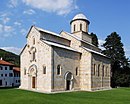Raška architectural school

You can help expand this article with text translated from the corresponding article in Serbian. (January 2011) Click [show] for important translation instructions.
|
Raška architectural school (Serbian: Рашка школа архитектуре), also known as the Raška style (Рашки стил, Raški stil), or simply as the Raška school, is an ecclesiastical architectural style that flourished in the Serbian Middle Ages (ca. 1170–1300), during the reign of the Nemanjić dynasty.[1][2][3] The style is present in several notable churches and monasteries: Studenica, Peć, Sopoćani, Morača, Arilje and many others. This style combines traditional Slavic architecture with early Christian church-design, and often utilizes a combination of stone and wood material.
Raška has the only extant significant, historical monument from the time of the acceptance of Christianity -- Church of the Holy Apostles Peter and Paul, Ras -- in Novi Pazar. Meanwhile, the other state, Zeta, had characteristics of the early Romanesque period, Latin in style.
Towards the end of the 12th century, however, Stefan Nemanja united Raška and Duklja. When his young son Sava founded the independent church in 1219, all these cultural bridges connected Serbia to the best-known centers of world art, Salonika and Constantinople one the one side and Venice and the Adriatic coast on the other.
Examples
[edit]- Studenica Monastery, founded by Stefan Nemanja in 1190
- Patriarchate of Peć, founded by Archbishop Arsenije I in ca. 1250
- Morača Monastery, founded by Stefan Vukanović in 1252
- Monastery of Sopoćani, founded by king Uroš I in 1259
- Church of Arilje, founded by King Dragutin in 1296
- Uvac Monastery, founded by the Nemanjic dynasty in the 13th century
- Gomionica monastery, founded in the 15th century
- Kumanica monastery, founded in the 15th century
- Mala Remeta Monastery, founded by King Dragutin in the 13th century.
- Dobrilovina Monastery, founded before the 16th century
- Monastery Moštanica, founded by King Dragutin in the 13th century
- Rmanj, built in 1443
- Monastery Uvac
- Gomionica
- Dobrilovina
- Monastery Moštanica is located near Kozarska Dubica
- Kumanica
- Mala Remeta
- Monastery Moraca built in 1252 by Stefan Vukanović Nemanjić
See also
[edit]References
[edit]- ^ Panić-Surep, Milorad (1965). Yugoslavia: Cultural Monuments of Serbia. Turistička štampa. p. 12.
the Raška school.. began with the formation of the state at the end of the 12th century, lasted throughout the 13th century..
- ^ McDonald, Gordon C. (1973). Area Handbook for Yugoslavia. U.S. Government Printing Office. p. 191.
The eleventh century and, especially, the twelfth witnessed a period of increased building and the emergence, under the Nemanijic dynasty, of the so - called Raska school of architecture..
- ^ Rossi, Maria Alessia; Sullivan, Alice Isabella, eds. (2020). Byzantium in Eastern European Visual Culture in the Late Middle Ages. BRILL. p. 168. ISBN 978-9-0044-2137-0.
Sources
[edit]- Народни музеј у Београду (2015). "Рашка школа архитeктуре". Догађања. National Museum of Serbia.
- Sir Banister Fletcher; Dan Cruickshank (1996). Sir Banister Fletcher's a History of Architecture. Architectural Press. pp. 322–. ISBN 978-0-7506-2267-7.








